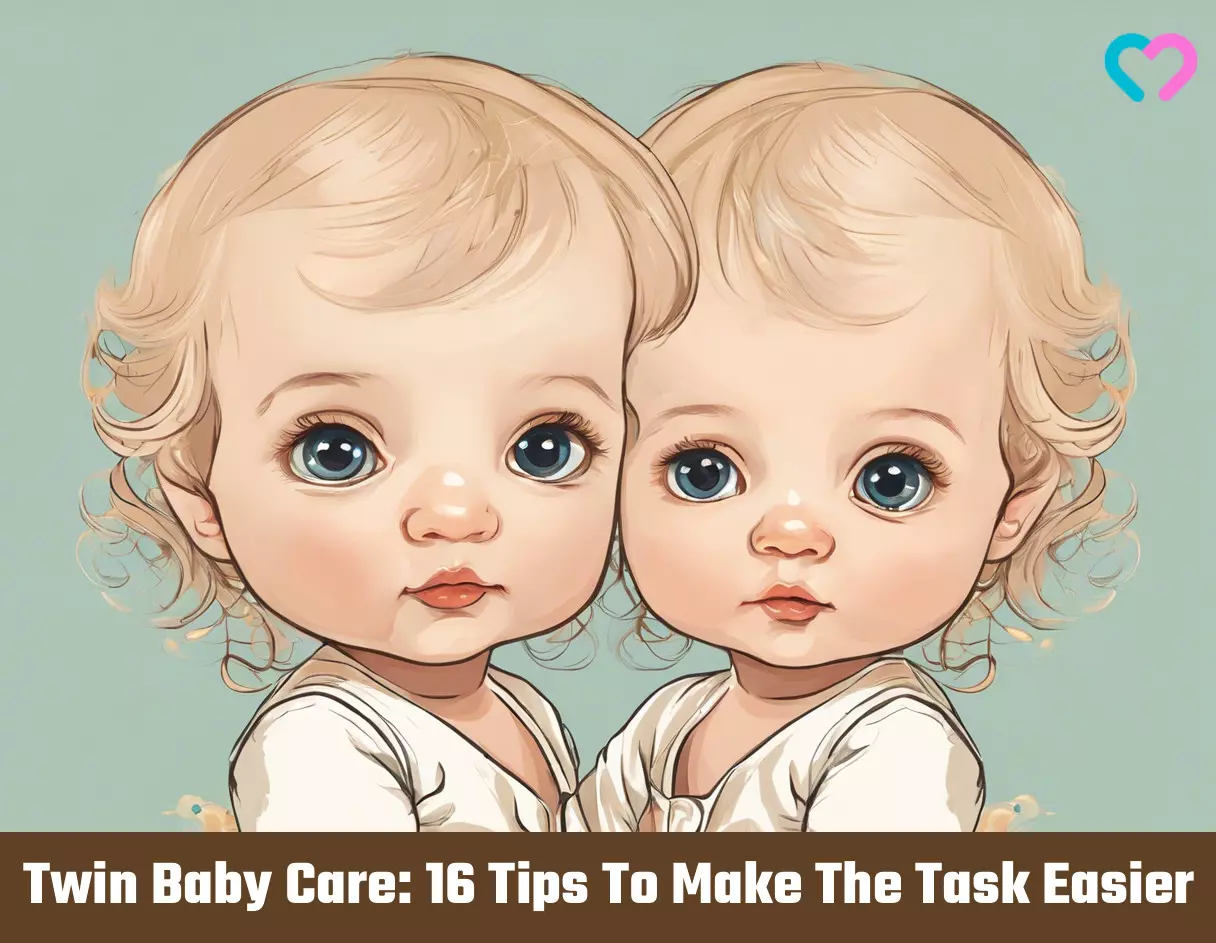
Image: iStock
Taking care of twins can get tiresome and overwhelming at times, but their happy and smiling faces at the end make all of that worth it. If you are wondering how to approach twin baby care, the simple answer will be to double everything. Double the effort and care! You just need some smart organizing tips to help you with it. So read on to learn some effective ways to care for your twins and see them reach developmental milestones.
Key Pointers
- Taking care and raising twins may be challenging and tiring, but a few measures can help ease the process.
- A twin feeding pillow can be used to feed both infants at once, and a coordinated eating and sleeping routine can be set up for the twins.
- To get the twins on the same schedule, their routines should be monitored for a few days, and help should be sought if needed.
- Gender-neutral clothes and a double stroller for twins are a must-have.
- Parents may buy baby supplies online to save time and money, and spare time for personal leisure.
- Furthermore, parents should take the time to get to know each twin and celebrate their differences.
Tips For Taking Care Of Twins
Here are some useful tips to look after the twins and have some relaxation too:
- Get your babies on the same napping and feeding schedule. This will ensure that you are not feeding and putting a baby to sleep all day. Dr. Shelly Flais, pediatrician and author of the book Raising Twins, suggests that “when one twin wakes up to feed, wake the other baby too”. This might mean going against the rule of not waking a sleeping baby, but is practical.

- Use a twin feeding pillow so you can feed both babies at the same time. Once they are in sync, managing them will become easier. Remember, however, to consult your pediatrician before starting any sleep and feed training to ensure that your babies are ready for it.
- Make a note of the twins’ schedule. For a couple of days, write down routines to help you get your babies on the same schedule. Keep track of the time and number of feedings and naps, as well as the number of diapers consumed. If you have difficulty feeding both babies together, choose to breastfeed one and bottle feed the other by expressing your breast milk into a bottle.
- Experiment with different ways to put the twins to sleep. Putting two babies to sleep at one time can be a Herculean task. Here are some strategies you may try:
- Take them around in a stroller
- Wear one baby in a carrier and the other in a swing
- Swaddle them in cribs
- Place them in bassinets
- Lay them on a floor blanket
You may also take note of the places your twins fall asleep easily, and try the above methods in those places.
- Invest in a double stroller or twin carrier bag. It will be difficult for you to carry your babies constantly and at the same time. Therefore, try to obtain a double stroller for your evening walks or other leisurely activities. You may also use the double stroller for carrying all supplies that the twins need.
 Point to consider
Point to consider
- Ask for help. Don’t hesitate to ask for help; taking care of twins is exhausting. Ask whomever you trust – family members, friends, or neighbors to assist you. You might also have your parents move in for the first few months to help out, if they’re willing. If this type of assistance isn’t available, consider hiring nannies or babysitters, if affordable.
Melissa McDermott, a mom of three, recounts the positive impact of seeking external assistance while caring for her twins. She says, “We didn’t have our parents close by, so we quickly accepted we’d have to pay for extra support. We kept our dog walker, full-time daycare for our toddler, and cleaning service. But this still didn’t make having twins manageable. We were drowning. We found a meal service that delivered homemade prepared dinners once a week, saving us for the first three to four months.
“By week three, I had called my husband at work crying enough times we ended up hiring occasional nanny support one to two half days a week. It was the only time I didn’t have a baby on me, and I had the freedom to leave the house easily and take time for myself (ⅰ).’’
- Join twin moms’ support groups. Local or online clubs for moms of twins to help parents connect with each other and share experiences, tips, and techniques. These groups will also promote your socialization, keeping you engaged while reducing feelings of isolation that are common among parents with young children, and offer an opportunity to get moral support from those who are in a similar situation.
- Shop baby supplies online. Having twin babies means running out of baby supplies at lightning speed. To save you time and energy, buy daily essentials like wipes, diapers, and creams, online. Buying online will give you better deals and help you track how long the stock lasts.

- Purchasing two of every item is not required. One of the most common mistakes new parents of twins do is buying two of each thing. While you will have to buy two of essential things like high-chairs, car seats, strollers, and cribs, you don’t have to purchase double the toys, books, creams, or talcum powders. This will save you money in the long run.
- Go for neutral gender clothes. If your twins are a boy and girl, you don’t have to buy them all the clothes based on their gender. You may want to dress up your princess in frocks occasionally, but for daily wear, you may go for unisex clothes so that you can interchange them.

- Don’t separate the twins once they are old enough to sleep through the night. You may think of having them sleep in different rooms so that if one is awake, he doesn’t wake the other. However, if you let them sleep in the same room they will learn to sleep through each other’s cries and noise. However, check what suits your babies’ preferences, and adjust accordingly.
- Set apart some time as your “me” time. No matter how well you plan your tasks, you are bound to feel exhausted by the end of the day. You need some time for yourself to relax and bounce back. Otherwise, you will wind up exhausted and overwhelmed with your daily routine. Do whatever you can to take a break from your chores to do what you enjoy most such as watching TV, relaxing in a hot bath, or reading a book. This will help you to rejuvenate and stay motivated, happy, and healthy while parenting your twins.
- Do chores alternatively. Talk to your husband and work out time shifts for attending the babies. You might tend to them together or separately, whatever works best for your family dynamics. Your husband can take the babies out for a stroll, buy the groceries, or do laundry. You both can opt for separate “me” times, to ensure you both find time to relax to prevent burnout and health issues.

- Plan ahead. Before bathing your twins, lay out towels, diapers, and clothes. Keep a bag packed with these essentials as well as water and snacks to use when you go out with the twins. You can simply grab the bag and go, sparing yourself some time each time you go out.
- Use alternatives like a travel cot or twin carriers to put your babies in while you do chores. You can hold one of your twins while the other rests in the cot, or place the babies together while you finish your tasks.
- Bathe the twins at the same time. Either accept help from someone else or buy two infant bathing seats so you can bathe them together. You will save time and energy if you can manage to pull off a double baby bath time.
 Quick tip
Quick tip
- Use freezer food. Cooking for the family while caring for two infants is no small feat. Prepare freezer food that you can simply reheat for supper. You may also cook crockpot recipes. No more standing by the stove for ages. Simply toss the ingredients, and eat prepared meals hours later.
Follow the tips above for an easier and more organized day. These tips will also ensure the complete safety and well-being of your kids. Next, we address some commonly asked questions of new parents of twins.
Frequently Asked Questions
1. I’m finding it difficult to cope with my twins. Is this normal?
Yes, it’s absolutely normal to find yourself in this situation. You are likely to worry about several things – if you are feeding both babies well, paying equal attention to them, doing anything wrong, etc. This is why it is necessary to seek physical and emotional support from friends, family, or professionals to make your day manageable.
2. How should I plan my maternity leave?
Plan your maternity leave depending on what suits your family. You may schedule it so that your husband can take his paternity leave just after your leave ends. This will ensure that at least one parent is with your twins until they complete their first year.
If you have sorted out help for childcare then you can prepare to go to work. However, if your maternity leave cannot be extended and you cannot fathom returning to work, talk to your employer. They may be able to offer you extended leave, work-from-home, or a part-time position. You may also consider taking a break from work for some time, if affordable for you.
3. Is it hard to take care of twins?
Taking care of twins can be hard because everything from feeding and diapering to laundry becomes a double task. Although new parents love caring for their newborns, caring for two babies at a time becomes emotionally difficult and draining. But the key to reducing this struggle and minimizing challenges is planning beforehand and not stressing too much.
4. How many types of twins are there?
Traditionally, research has found that twins are of two types, identical and fraternal. Identical twins are conceived from a single fertilized egg and share the same genetic traits. Fraternal twins imply two fertilized eggs and don’t look exactly alike. They can also have different sexes at birth.
Recent research suggests that there’s a third type of twin, called polar or half-identical twins. They share the same chromosomes as their biological parent but get distinct chromosomes from their non-biological parent. Fraternal twins that look slightly similar are thought to be polar twins (1).
5. At what age does taking care of twins get easier?
Managing twins gets easier when they reach three months. At this time, they can sleep for long and form more predictable sleep and waking-up patterns. From three to six months, twins start noticing the world around them and exploring it.
6. Can my twins develop codependency issues?
As hard as it might sound, twins can develop codependency issues. This dependence is mainly because they are always in contact with one another and share more leisure activities than non-twin siblings. The thought of separation might lead to a high degree of psycho-emotional distress, especially during adolescence.
Raising twins is a lot of labor but brings immense joy to the family. A rule of thumb for twin-baby care to ensure optimal development is to double everything. However, you may avoid being doubly stressed by following some simple tips. Syncing your babies’ sleep patterns, feed, and bath schedules, using a double stroller, choosing gender-neutral clothing, and shopping online for baby supplies may help you take off some load. Additionally, you should seek help from your husband or other family members to take turns on chores and avoid being overwhelmed. However, if you are anxious and need help, you may consult a professional.
Infographic: Valuable Suggestions For Taking Care Of Twins
Caring for twins can be a rewarding yet challenging experience. So, if you are blessed with two bundles of joy, you must plan and make arrangements to take care of them to avoid anxiety and exhaustion. This infographic presents suggestions for caring for twins, but remember to take care of yourself too! Illustration: Momjunction Design Team
Illustration: Twin Baby Care: 16 Tips To Make The Task Easier

Image: Stable Diffusion/MomJunction Design Team
Personal Experience: Source
MomJunction articles include first-hand experiences to provide you with better insights through real-life narratives. Here are the sources of personal accounts referenced in this article.
ⅰ. Surviving The First Year With Twins: My 4 Pieces Of Advice I Wish I Had Known.https://medium.com/@mcdermott.mel/surviving-the-first-year-with-twins-my-4-pieces-of-advice-i-wish-i-had-known-a313eb34d634
References
- A review of mechanisms and evidence for typical and atypical twinning.
https://www.ajog.org/article/S0002-9378(15)02235-8/fulltext
Community Experiences
Join the conversation and become a part of our nurturing community! Share your stories, experiences, and insights to connect with fellow parents.
Read full bio of Dr. Maggie C. Vaughan
Read full bio of Dr. Ritika Shah
Read full bio of Swati Patwal
Read full bio of Ghazia Shah

















